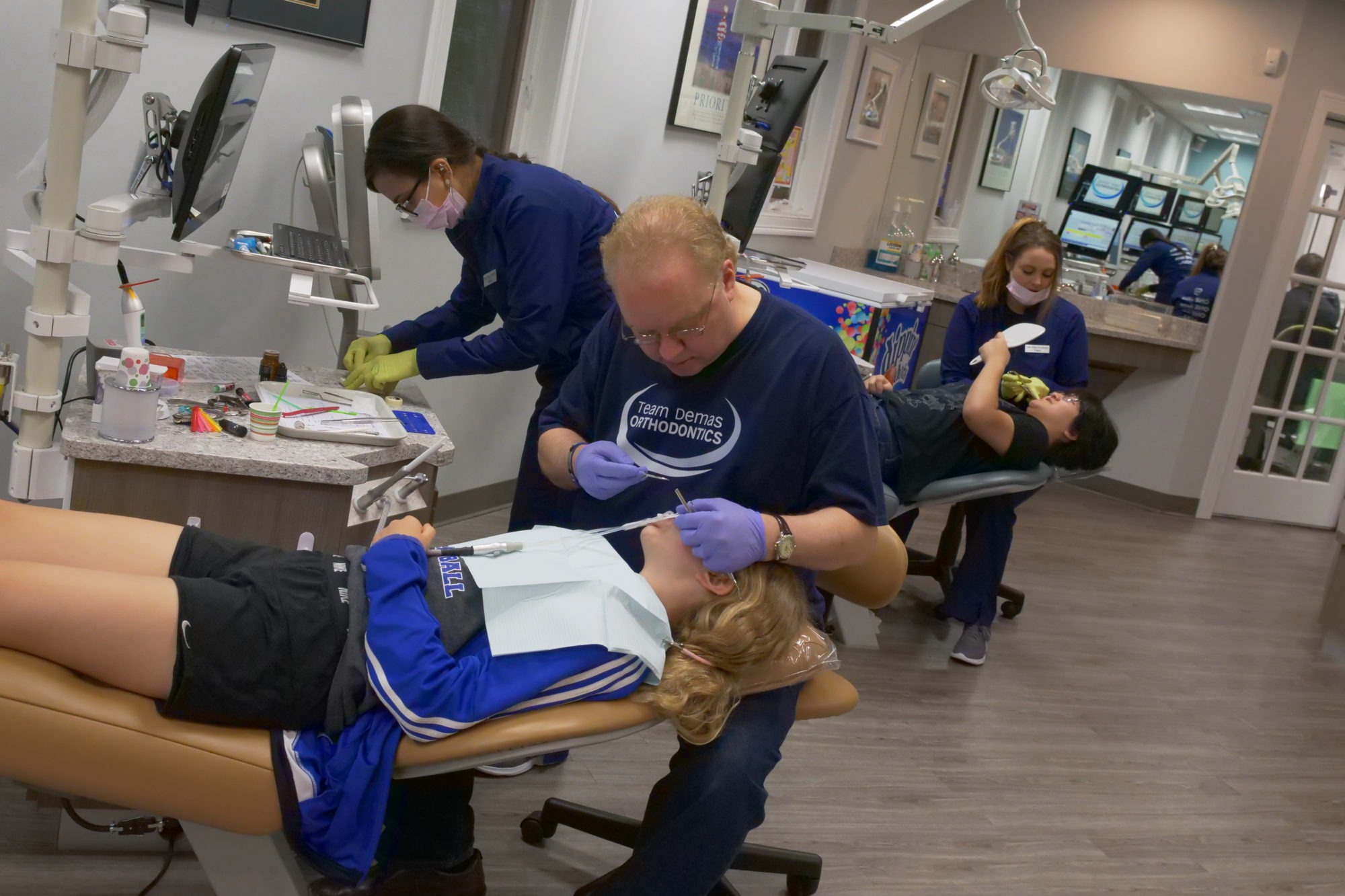
Orthodontic Treatment And Your Wisdom Teeth

Here at Team Demas Orthodontics, we know that there’s a lot to think about and consider before undergoing orthodontic treatment. We also know the hard work and dedication it takes to get the results you want. Throughout the process, you’ll find yourself learning quite a bit about orthodontics, and becoming more familiar with your teeth and all the incredible things they’re capable of. Over time, you’ll gain knowledge about the part braces or aligners play in moving your teeth, but one related subject you may be missing solid information on is wisdom teeth.
Yep, wisdom teeth! Because these late-bloomers aren’t really a common topic in orthodontics, it may be surprising to learn the role they can play in your overall oral health. We sometimes have patients (or parents) who worry that emerging wisdom teeth will interfere with orthodontic treatment, or fret that they will knock a straightened smile off-kilter. Let’s explore these teeth below to learn a little more about what they are, when to remove them and when to leave them alone, and what all of this means for you as an orthodontic patient.
What are wisdom teeth? What are they for?
Wisdom teeth are your third set of molars, the teeth that grow right at the back of your jaw. Although they don’t serve any useful function in the modern world, they played a large part in helping our ancestors properly chew and digest the coarse foods that composed most of their diet, such as meat, nuts, and roots. As we began evolving to a more varied diet, our jaws shrunk in response, rendering our wisdom teeth more or less obsolete.
In many adults, the wisdom teeth are missing entirely, or they never fully come through. For others, the wisdom teeth will come through in proper alignment with little more than a bit of slight tenderness. In those cases, further action generally won’t be required. But because the wisdom teeth grow in stages over time instead of all at once, if you do end up having an issue with yours, you may experience long periods of pain or discomfort as they erupt. By knowing what to expect, you’ll be able to work with us and your dentist in order to avoid any unnecessary suffering!
When should wisdom teeth be removed?
Wisdom teeth have often been preemptively removed as a way to prevent orthodontic crowding. However, most modern evidence has shown this to be unnecessary. If the goal of any medical procedure is to solve a problem for the patient and to improve their health, it follows that wisdom teeth erupting without difficulty can be monitored through regular dental check-ups, rather than removing them as a preventative measure.
There are, of course, some cases where removal of the wisdom teeth makes sense and is necessary. This may include situations where:
- there are recurring infections in the gums or cheeks, often due to wisdom teeth trapping food debris and the bacteria that forms as a result of that
- the wisdom teeth have developed serious decay
- the wisdom teeth are causing tooth decay in adjacent teeth
- the wisdom teeth have developed a cyst or abscess
- the wisdom teeth are impacted – coming in sideways, stuck beneath the gum, or are only partially erupted, which can lead to swollen, infected, and painful gums
Even if you have one or more of these issues as your wisdom teeth grow in, it doesn’t necessarily mean all of your wisdom teeth will need to be removed. In many cases, removal may be recommended for just the top or bottom wisdom teeth, or those on one side only.
Can wisdom teeth affect orthodontic treatment?
Many patients will begin their orthodontic treatment before the wisdom teeth start pushing their way through the gums. This is because wisdom teeth don’t typically make an appearance until your late teens or early twenties. The good news is, even if they start to emerge as you’re straightening your teeth, orthodontic treatment will generally not be affected. Most people are able to continue the treatment process easily and without interruption. Wisdom teeth can even be extracted while wearing braces if necessary, but if yours are coming through normally with no issues, it is unlikely removal will be recommended. You know the old saying – why fix it if it isn’t broken?

Can wisdom teeth affect the results of orthodontic treatment?
As mentioned above, your wisdom teeth tend to show up in your late teens to early twenties. Some patients may also see a slight shifting of their teeth around this time, too. Although this is part of a natural phenomenon known as relapse, it’s easy to see why people would believe wisdom teeth are the culprit when you consider the timing.
However, The University of Iowa took this theory on in a study involving sensors placed between the teeth of their subjects. Researchers compared the pressure on the sensors with and without wisdom teeth, and ultimately found that there was no difference between the two at all. This proved that wisdom teeth aren’t able to exert enough pressure on their own to cause other teeth to shift. But if erupting wisdom teeth aren’t a factor in the teeth drifting, you may be wondering what is.
The answer to that is surprisingly simple: we get older!
As we age, our teeth begin showing general signs of wear and tear, and a natural shifting may occur. This can cause our teeth to begin overlapping, moving them slightly forward. If the teeth begin to overlap, the upper teeth can press the lower teeth in towards the tongue. Our jaws are often still growing at this time as well, which can force the teeth into less than ideal positions.
If you’re a Team Demas orthodontic patient, you’ve probably heard Dr. Demas and the rest of our team talk about how important retainers are to the overall success of your treatment plan. Without regular retainer use, your teeth may begin shifting back towards their original positions, undoing all the work you’ve put into the orthodontic process. Wearing your prescribed retainer as directed by Dr. Demas is an incredibly simple yet highly effective tool to keep your teeth as straight as possible once your braces come off or you use your last aligner.

Trust Team Demas Orthodontics to give you a lifetime of straight smiles
It’s unlikely your wisdom teeth will affect the beautiful smile you’ve achieved with braces or aligners, but every patient and case is different. If you have any worries about the way your wisdom teeth are growing in, we recommend scheduling an appointment with your general dentist. He or she can take a look and let you know what you can expect throughout the eruption process. We’re also happy to set your mind at ease if you’re feeling nervous about your wisdom teeth affecting your smile.
At Team Demas Orthodontics, we want you to feel confident in your orthodontic treatment from start to finish. Dr. Demas will work closely with your dentist to ensure a smile that is aligned, healthy, and fully functional. If you have any questions or concerns about your treatment plan or your oral health, get in touch with us today. We care about your smile, your comfort, and your care!
